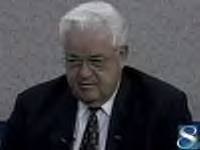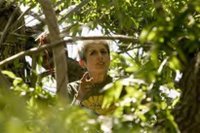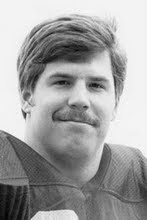
Soldier sons' life, death link two mothers
By Allen G. Breed
ASSOCIATED PRESS
HOLIDAY, Fla. -- Rita Richardson smiles at the memory: Her young son Dan, prowling the woods dressed in camouflage and green face paint or jumping off the shed like a paratrooper. But she wanted him to know that war was more than a game.
Each Memorial Day, she would take him to Arlington National Cemetery, near their Virginia home, so he would appreciate the sacrifices honored there. This Memorial Day, she will be there in spirit as her soldier son trains for another overseas deployment.
Janice Pvirre will be at Arlington in person. She will join the other Gold Star Mothers, those who have lost children in combat, to lay a wreath and to say a prayer at a white marker engraved with the emblem of this nation's highest military honor.
Her son, Army Sgt. 1st Class Paul R. Smith, died in a courtyard outside Baghdad, fatally wounded in a firefight while showing "conspicuous gallantry and intrepidity ... above and beyond the call of duty" -- a sacrifice that made him the only service member awarded the Medal of Honor in the Iraq war.
Among those Sgt. Smith's actions saved: Dan Richardson, who has recently married and himself been promoted to sergeant.
That knowledge is both a blessing and a burden, for one mother to know that any milestone she will celebrate with her son -- a birthday, a holiday, the birth of a child -- was made possible by another mother's loss.
"We have been drawn together for some reason, and we're both intrigued about that reason," Mrs. Richardson says. "There is a destiny behind all of this. And it's not over. It's not played out yet. We don't know where it's going from here."
Mrs. Pvirre thinks her son's fate was determined when he was 5.
One day, someone at school asked Paul what he wanted to do when he grew up. "I'm going to go in the Army," the green-eyed boy declared.
He did join the Army, in 1989, but at first he wasn't much of a soldier. Stationed in Germany, Sgt. Smith drank too much and, on a couple of occasions, slept right through formation.
The first Persian Gulf War changed him, his mother says.
The man who once partied late into the night had become obsessed with training and discipline. Sgt. Smith, who had married shortly after that war in 1992 and had become a stepfather, then a father, told his wife that he feared he hadn't seen the last of Iraq. Making sure his men were ready became a priority, Birgit Smith says.
"He said, 'We are not done. We're going back. We didn't finish,'?" the young widow says. "It was just a matter of time."
That time came in March 2003, and Sgt. Smith was ready.
"There are two ways to come home, stepping off the plane and being carried off the plane," he wrote in a letter to his parents. "It doesn't matter how I come home because I am prepared to give all that I am to ensure that all my boys make it home."
One of those "boys" was Dan Richardson.
When Dan was about 12, his mother took him to a gathering of World War II veterans, where, as a National Archives official, she'd been asked to give a speech on that war's most decorated hero -- Audie Murphy.
Young Dan helped gather signatures on a petition for a postage stamp honoring Mr. Murphy.
When he was 17?, Dan asked his parents for permission to join the Army. They happily signed his papers.
He ended up at Fort Stewart, Ga., with B Co. of the 11th Engineer Battalion, part of the 3rd Infantry Division -- Audie Murphy's division. And now, Sgt. Smith's division.
On April 4, 2003, early in the war, Sgt. Smith and his combat engineers were part of a 100-member force tasked with constructing a roadblock on the highway to Baghdad. Pfc. Richardson, all of 18, carried his platoon squad's automatic weapon.
Sgt. Smith's troops were erecting a pen to hold some Iraqi prisoners when someone spotted an enemy force of about 100 -- armed with AK-47s, rocket-propelled grenades and 60mm mortars.
Sgt. Smith organized a hasty defense of two platoons, a Bradley fighting vehicle and three armored personnel carriers, according to official reports.
While shouting orders, he went to work himself, lobbing grenades and firing on the Iraqis to cover the evacuation of three wounded soldiers.
Sgt. Smith then climbed into the gun turret. With his upper body exposed, he blasted an Iraqi-controlled tower with .50-caliber machine-gun fire.
He had emptied three 100-round cans of ammunition when the gun suddenly went silent. Pfc. Richardson and the others nearby heard someone yell, "Sgt. Smith is hit!"
A bullet had pierced Sgt. Smith's skull. The ceramic breastplate in his flak jacket was shattered. Littering the ground were the bodies of more than four dozen Iraqis.
Sgt. Smith was the only U.S. casualty in the courtyard. He was 33 years old.
In the four-page letter from her son afterward, Mrs. Richardson learned the harrowing tale of gunfire and confusion, and of the sergeant who had held them all together.
"It is because of him that I'm not dead," her son wrote. "He gave his life defending us."
Grief and gratitude will always link the soldiers' families, Mrs. Richardson says.
"Obviously, we will never forget what happened," she said recently at her home in Sebastian on Florida's East Coast, where she and her husband retired in 2004. "Something put him in that place at that time in those circumstances."
Letters and e-mails from the families of others who served with Sgt. Smith still come to his mother and widow, thanking them for his sacrifice.
Mrs. Pvirre says it hurts to know that because of that sacrifice, her son was not there last October to give his stepdaughter Jessica away in marriage. When 12-year-old David enters seventh grade this fall, it will be in a middle-school building named for a father who is no longer there.
If anyone owes her anything, she says, it is to live as good a life as possible, so that his death was not in vain.
"I don't feel that they need to thank me," she says. "I mean, I had 33 wonderful years with this boy. I have been thanked enough. I'm blessed."

 That or "Yarr, Genius" are two things my wife and I say when we come across something REALLY stupid. Leonard BOZO-well, a 72 year old man, on myspace is REALLY stupid!
That or "Yarr, Genius" are two things my wife and I say when we come across something REALLY stupid. Leonard BOZO-well, a 72 year old man, on myspace is REALLY stupid!










































